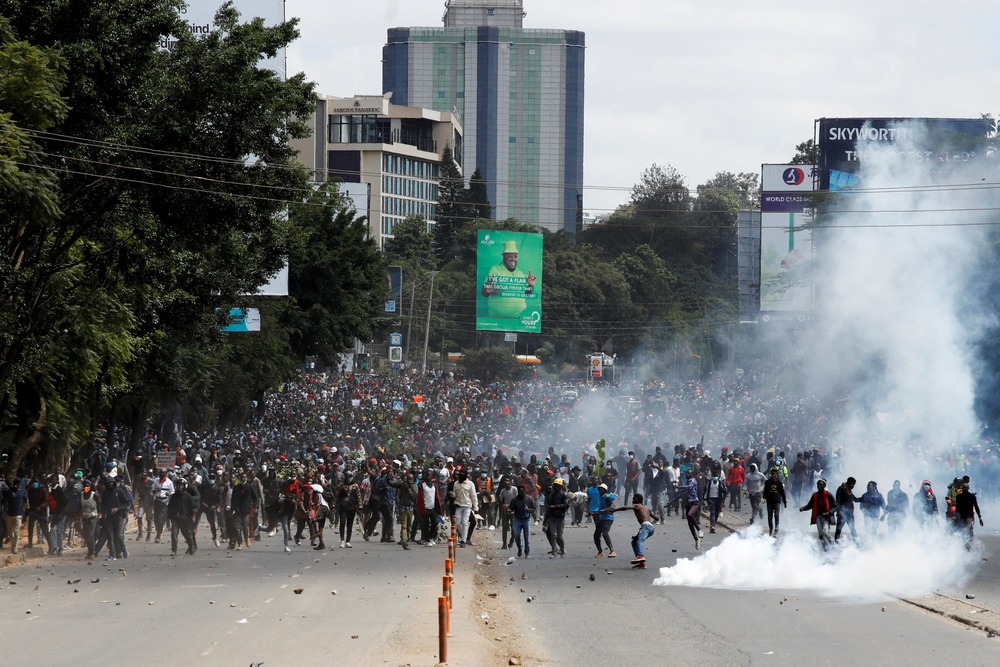
Protesters march in the street during a demonstration in Nairobi June 25, 2024, against Kenya's proposed finance bill to raise taxes. After Parliament passed the measure, it was sent to Kenyan President William Ruto for his signature or other action. In the face of chaos, Ruto rejected the bill June 26. (OSV News/Monicah Mwang, Reuters)
The Kenyan capital descended into chaos June 25 as protests over legislation dubbed a finance bill left several dead and dozens injured. The country's bishops called for peace and urged the president not to accede to the measure aimed at raising revenue by levying additional taxes.
The bishops spoke June 25 moments after mostly young protesters overwhelmed riot police and stormed parliament buildings, where legislators had just passed the bill. Initial reports indicated that at least five people died and over 30 were injured in the protests. Amnesty Kenya said in a June 25 post X, formerly Twitter, that those killed had been treating the injured, The Washington Post reported. On June 26, AP reported the death toll had reached at least 22.
Parliament had approved the bill, moving it through to a third reading by lawmakers, and the legislation was sent to Kenyan President William Ruto for him to either sign it or send it back to parliament. On June 26, Reuters and other news outlets reported that the president said he was rejecting the finance bill and was withdrawing it.
The finance bill proposed increasing taxes on basic commodities such as bread, cooking oil, and phone and internet usage, because the Kenyan government says it needs to raise taxes to reduce the nation’s budget deficit.
"The country is bleeding and therefore we invite the Government to reflect on this matter with the seriousness it deserves," Archbishop Maurice Muhatia Makumba, president of the Kenyan bishops' conference, told journalists at a June 25 news conference, where he read his prepared statement.
"We believe the President has the means and the will to bring back sanity to our Nation, by not signing the Finance Bill into law for better participation, taking into account the voices of many Kenyans," Makumba said.
As protests spread in all towns across the country, the bishops expressed sadness that what started as "lawful protests" had deteriorated into "violent conflict." The development, the bishops said, moved them to speak clearly to the nation and its governing bodies.
"We appeal and plead that we have a moment of reflection and listening," Makumba said, adding that violence was nowhere in the initial aim of the youth protests. "We earnestly appeal to the police not to shoot at the protesters. We also appeal to the young people to remain peaceful."
Earlier, Archbishop Philip Subira Anyolo of Nairobi condemned the firing of bullets and tear gas canisters into the Holy Family Basilica in the capital, where doctors had set up a rescue center.
The attack hit a Kenya Red Cross tent erected inside the basilica compound to offer medical treatment and other forms of assistance to injured protesters. The basilica is several feet away from the parliament buildings.
"This is very sad. We condemned it. The basilica is a holy sanctuary and that’s what it should remain," Anyolo told OSV News.
Advertisement
According to the bishops, the Finance Bill, if it had been signed in its current form, would add "pain to many families" who are already suffering the consequences of the previous year’s bill to hike taxes.
Makumba said the bishops' conference had recently raised its serious concerns on the bill and appreciated some major revisions, but the bishops felt the legislators had not addressed some of their important suggestions.
"We emphasize that every citizen must pay taxes. But the Government must not overtax its citizens," said the archbishop.
Anyolo said the president could calm down the country by not signing it.
"As we ask the president not to accede to the bill, the president should know that the people are suffering. They have nothing to eat and this is a response to the situation they are in," said Anyolo. "The youth should also understand that violence is not the best, because violence cripples and people do not move forward."
The bill began generating heat in its first reading in May, when the citizens complained about an extraordinary hike of taxes that generated more heat than past bills.
By its second reading, a wave of resistance was triggered, with youth organizing protests through Tik Tok, X and other social media networks. On June 25, the youth had stormed parliament buildings and torched part of them.
"The young generation is alive to the negative impact punitive taxes have in their own lives," said Makumba, while urging the government to face the plain truth that families are immensely suffering.
Meanwhile, as the bishops commended the youth, they also advised them to shun the protests and consider peaceful ways to solve their challenges.
"With your creativity and innovative technology tools available, which you are using to organize yourselves and pass your message to the government, you need to consider more innovative approaches to draw constructive engagement to address the social and economic woes our country is facing," said Archbishop Antony Muheria, while reading part of the bishops statement at the news conference.
In a national address on the evening of June 25, Ruto said all means will be used to thwart any attempts by "dangerous criminals" to undermine the security and stability of the country.
In a new development, the parliament has passed a request by the Cabinet's secretary of defense to deploy the military, with church leaders and politicians accusing the government of unnecessary use of excess force against unarmed youth.






